
Convolvulaceae, commonly called the bindweeds or morning glories, is a family of about 60 genera and more than 1,650 species. These species are primarily herbaceous vines, but also include trees, shrubs and herbs. The tubers of several species are edible, the best known of which is the sweet potato.
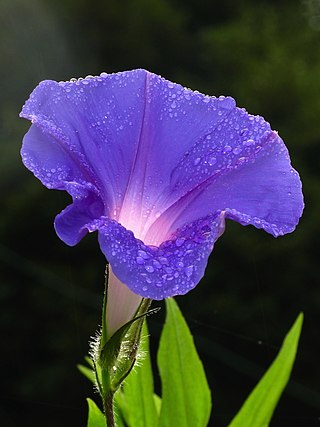
Morning glory is the common name for over 1,000 species of flowering plants in the family Convolvulaceae, whose current taxonomy and systematics are in flux. Morning glory species belong to many genera, some of which are:

Convolvulus is a genus of about 200 to 250 species of flowering plants in the bindweed family Convolvulaceae, with a cosmopolitan distribution. Common names include bindweed and morning glory; both names shared with other closely related genera.
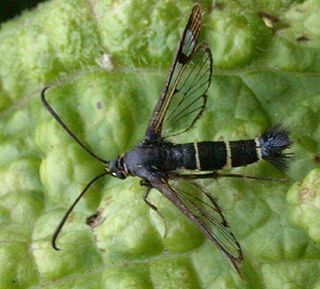
The Sesiidae or clearwing moths are a diurnal moth family in the order Lepidoptera known for their Batesian mimicry in both appearance and behaviour of various Hymenoptera.
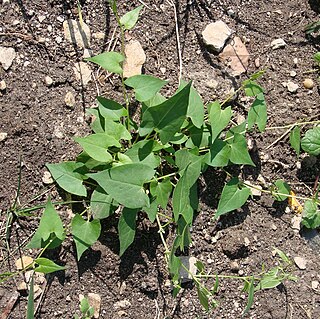
Fallopia convolvulus, the black-bindweed or wild buckwheat, is a fast-growing annual flowering plant in the family Polygonaceae native throughout Europe, Asia and northern Africa.

Asterix and the Roman Agent is the fifteenth volume of the Asterix comic book series, by René Goscinny (stories) and Albert Uderzo (illustrations). It first appeared as a serial in Pilote magazine issues 531–552 in 1970 and was translated into English in 1972.
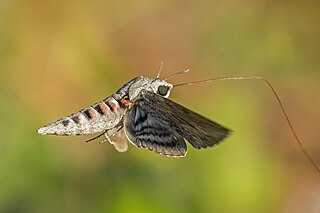
Agrius convolvuli, the convolvulus hawk-moth, is a large hawk-moth. It is common throughout Europe, Asia, Africa, Australia and New Zealand, partly as a migrant. In New Zealand, it is also known as the kumara moth, and in the Māori language as hīhue.

Convolvulus arvensis, the field bindweed, is a species of bindweed that is rhizomatous and is in the morning glory family (Convolvulaceae), native to Europe and Asia. It is a climbing or creeping herbaceous perennial plant with stems growing to 0.5–2 metres in length, usually found at ground level, with small, white and pink flowers.

Viktor Bernhard "Faffan" Jansson was a Finnish sculptor belonging to the Swedish-speaking minority of Finland.

Emmelina monodactyla is a moth of the family Pterophoridae. It is found in Europe, Japan, central Asia, North Africa and North America.

Emmelia trabealis, the spotted sulphur, is a moth of the family Noctuidae. The species was first described by Giovanni Antonio Scopoli his 1763 Entomologia Carniolica.

Convolvulus tricolor is a species of flowering plant in the family Convolvulaceae, native to Mediterranean Europe. Common names include dwarf morning-glory, tricolour convolvulus, and belle de jour.

Bedellia somnulentella, the sweet potato leaf miner, is a moth in the family Bedelliidae.

HMS Convolvulus was a Flower-class corvette of the Royal Navy in World War II. She was launched in 1940, served in the Battle of the Atlantic and was scrapped in 1947.
Negotinthia myrmosaeformis is a moth of the family Sesiidae. It is found in the countries around the Black Sea, including Ukraine, southern Russia, Romania, Bulgaria and the southern part of the Balkan Peninsula. It has also been recorded from Asia Minor, northern Iraq, Armenia and Azerbaijan.

Bembecia scopigera, the six-belted clearwing, is a moth of the family Sesiidae. It is found from central Spain over most of south-western and central Europe, the Balkans, Greece, southern Russia and Ukraine to Turkey.

Pyropteron triannuliformis is a moth of the family Sesiidae. It is found from most of Europe to the Near East and Central Asia.
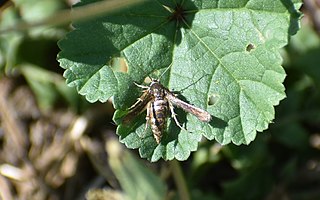
Microsphecia tineiformis is a moth of the family Sesiidae. It is found in southern Europe. It has also been recorded from Morocco, Algeria, Tunisia, Asia Minor, Armenia and from Azerbaijan to northern Iran and northern Iraq.

















